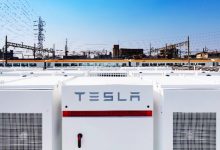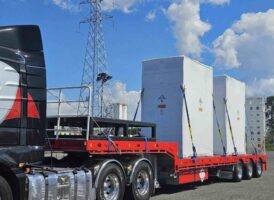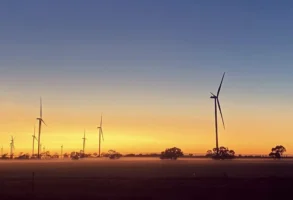Tesla founder and CEO Elon Musk says the company is anticipating a 300 per cent lift in its battery storage market is it overcomes “battery cell scarcity” that has severely crimped deliveries of its Powerwall and Powerpack products.
Musk said on Thursday (Australian time) at the release of the company’s first quarter results that the company had been throwing all its battery production to support the ramp up of production of the top selling Model 3 electric sedan.
All its production lines in the company’s Gigafactory in Nevada had been converted to focus on the Model 3, and the company had had to “scrounge” battery cells from around the world to continue some level of production on the domestic Powerwall and commercial and grid scale Powerpack battery storage products.
“This year, we expect to allocate 5 to 10% of cell output to energy storage,” Musk said in an analysts call. “There are far fewer cells in a Powerwall than in a car …. so that translates into a decent amount of Powerwall.”
Because of the different demands of the two technologies, Tesla was a blessing to source a variety of cells from different providers for its battery storage products. The EVs need the battery cell source to be homogenous.
“We see 300 per cent growth in powerwall … much faster than automotive,” Musk said. Battery storage will become a bigger and bigger percentage of the Tesla business over time.”
In the first quarter, the battery storage business grew only two per cent, but production in the first quarter has now grown 30 per cent as more capacity was switched back to the energy business. Tesla is also looking to refocus its pricing and delivery for battery storage products, which
“For residential solar and energy storage, traditional industry-wide sales techniques require customized systems, installations and purchasing processes. This results in a cumbersome buying experience and limits market potential.
“As we have done for the vehicle business, the key to accelerating mass adoption is to standardize the product offering, simplify the customer buying experience, and focus on the markets with the strongest economics.
“Our residential customers can now purchase solar and energy storage directly from our website, in standardized increments of capacity.”
Tesla delivered a net operating loss of $US522 million for the first quarter, mostly the result of a delivery bottleneck as it expanded into European and Chinese markets, and what Musk described as an “insane” logistical challenge that it now expects to have solved.
You can read more about Tesla’s results and other related stories on our EV-focused website The Driven.










